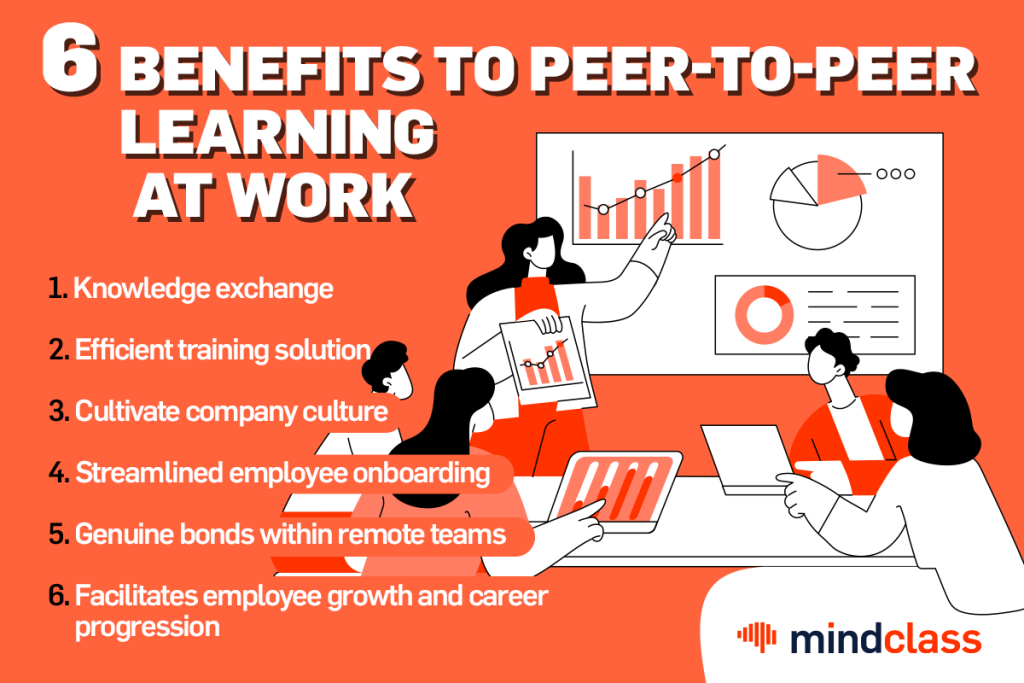Companies are constantly looking for innovative ways to improve employee development, promote a culture of collaborative learning and foster organizational growth. One effective approach that has gained momentum is peer learning or peer-to-peer learning. By harnessing the collective knowledge and expertise of employees, peer-to-peer learning offers a unique opportunity to empower teams, encourage continuous learning and promote a culture of cooperative learning.
Peer learning: Unleashing the power of collective expertise
Peer learning facilitates the sharing of knowledge, skills, and best practices between employees. It enables individuals to share their expertise, learn from each other’s experiences and gain valuable insights. This collaborative learning environment enriches the collective pool of knowledge, promoting skills enhancement and fostering a culture of continuous learning through cooperative learning.
Building a culture of collaboration: cultivating strong connections through peer learning
Implementing peer learning initiatives fosters a sense of community and belonging within the organization. Employees become active participants in each other’s growth journey, forging stronger bonds and building trust among team members. This nurturing environment creates a positive workplace culture that emphasizes support, empathy, and shared successes.

Personalized learning experience: Strengthening individual development
Peer-to-peer learning allows employees to tailor their learning experiences to their unique needs and interests. Unlike traditional training programs peer learning encourages self-directed learning, allowing individuals to choose topics that align with their career aspirations and areas for improvement.
Boosting employee engagement: boosting motivation and commitment
Engaged employees are more likely to be motivated, productive, and committed to their roles. Peer learning provides a sense of ownership and autonomy in the learning process, leading to higher levels of employee engagement and job satisfaction.
Fast and scalable learning: Stimulating knowledge acquisition on demand
Incorporating peer learning into an organization’s learning and development strategy enables a faster and more scalable way of disseminating knowledge. Instead of relying solely on formal training sessions, employees can access relevant information on demand from their peers, ensuring immediate application and results.
Cultivating a peer learning culture: Creating a foundation for success
Fostering a peer learning culture
Create an environment that encourages and values continuous learning. Recognize and celebrate knowledge sharing and reward employees who actively engage in peer learning initiatives.
Create peer learning groups
Form small cross-functional learning groups based on shared interests or learning objectives. These groups can meet regularly to discuss topics, share experiences, and collaboratively solve challenges.
Using technology to facilitate peer learning
Take advantage of digital tools and platforms to facilitate peer learning. Online forums, virtual collaboration spaces and video conferencing can connect employees across locations and time zones.
Encouraging informal learning
Learning takes place beyond formal training. Employees succeed in sharing information during team meetings through cooperative learning.
Peer learning is a powerful tool that can transform the way organizations approach employee development and promote a culture of collaboration. By embracing peer learning, organizations can harness the collective intelligence of the workforce, increase employee engagement and drive innovation. By implementing well-designed strategies, companies can create a vibrant learning community that enables employees to learn, grow and excel together, ensuring sustained success in today’s competitive business landscape.
Complete your employees’ educational journey with mindclass. They can access high-quality training courses anytime, anywhere, helping them achieve the best results through constant learning and development.





